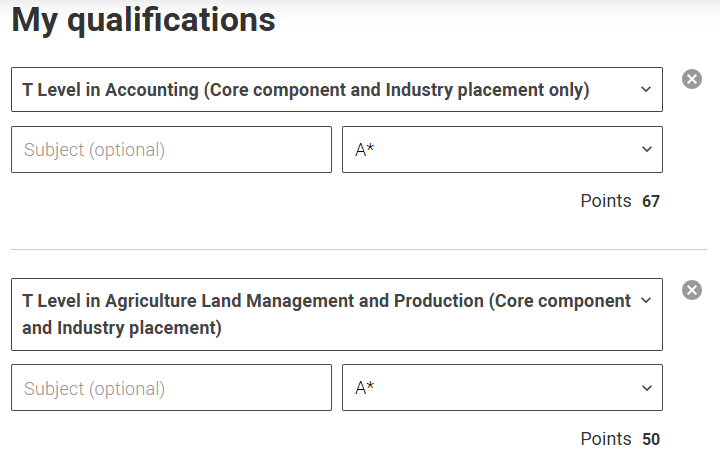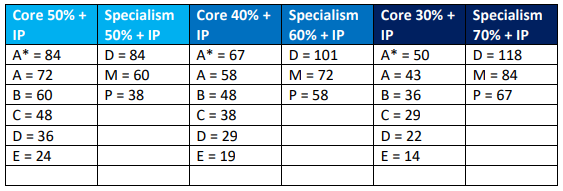T Levels
Facts about T Levels: what's involved in studying them, how they are assessed, and how long they take to complete.
What are T Levels?
T Levels are two-year courses equivalent to three A levels. They launched in September 2020 to students in England. This means that after their GCSEs, students now have the option to study either T levels, A levels, a Level 3 apprenticeship or another equivalent qualification.
Following GCSEs, students have the option to study one of the following pathways:
- T Levels
- apprenticeship
- A levels
T Levels are based on the same standards as apprenticeships, designed by employers, and will offer around 1,800 hours of study over two years. This will include a 45-day work placement, so T Levels will be more suited to students who know what occupation or industry they want to move into.
T Levels include compulsory elements:
- a technical qualification which includes core skills, theory, and concepts for the industry area
- specialist occupational skills and knowledge of the career
- an industry placement with an employer
- a minimum standard in maths and English, if students haven’t already achieved this
How are T Levels graded?
Students who complete a T Level will receive an overall grade of pass, merit, distinction or distinction* and will be awarded with a nationally recognised certificate showing a breakdown of what they’ve achieved. It will also confirm that a student has met the minimum requirements for maths and English qualifications.Are T Levels included in the UCAS Tariff?
Students who want to progress into higher education will be able to see how UCAS Tariff points are allocated to their T Level.
| UCAS Tariff points | T Level overall grade | A level |
|---|---|---|
| 168 | Distinction* (A* on the core and distinction in the occupational specialism) | AAA* |
| 144 | Distinction | AAA |
| 120 | Merit | BBB |
| 96 | Pass (C or above on the core) | CCC |
| 72 | Pass (D or E on the core) | DDD |
If you do not achieve the full T Level qualification, but have achieved either the Core or Occupational Specialism, you may still be accepted by your university or college. Universities and colleges have been provided with a range of information to help understand the skills developed as part of a T Level.
Tariff points for Partially Achieved T Levels
In the following scenarios, a student will be awarded a 'Partially Achieved' grade on their T Level:
- Student completes the Core Component and the Industry Placement (but does not complete the Occupational Specialism).
- Student completes the Occupational Specialism and the Industry Placement (but does not complete the Core Component).
Students who achieve one of these outcomes are still able to receive Tariff points.
The number of Tariff points a student receives depends on the weighting of the Core and Specialism in the T Level they have taken:
- A T Level with a 50/50 weighting means the Core and the Specialism take about the same amount of time to complete, so the Tariff points awarded to each component will be the same.
- A T Level with a 30/70 weighting means the Core (30%) is much smaller than the Specialism (70%), so the Core receives fewer Tariff points than a Core worth 50%, whereas the Specialism (70%) receives more Tariff points than a Specialism worth 50%.
Please note: You do not need to know the weighting of your T Level – every T Level is listed individually in the Tariff Calculator, with the correct Tariff points already worked out for you. As you can see below, these two T Levels have different weightings, so the points awarded to an A* in the Core are different:

Here is the full range of Tariff points awarded to a Partially Achieved T Level (IP = Industry Placement):

What T Level subjects are available?
Agriculture, environmental and animal care
- Agriculture, Land Management and Production
- Animal Care and Management
Business and administration
- Management and Administration
Construction
- Building Services Engineering for Construction
- Design, Surveying and Planning for Construction
Creative and design
- Craft and Design
- Media, Broadcast and Production
Digital
- Digital Business Services
- Digital Production, Design and Development
- Digital Support Services
Education and early years
- Education and Early Years
Engineering and manufacturing
- Design and Development for Engineering and Manufacturing
- Maintenance, Installation and Repair for Engineering and Manufacturing
- Engineering, Manufacturing, Processing and Control
Health and science
- Health
- Healthcare Science (last cohort September 2025)
- Science
Legal, finance and accounting
- Accounting
- Finance
- Legal Services
Sales, marketing and procurement
- Marketing (September 2025 onwards)
Find out more on the GOV.UK T Levels website.